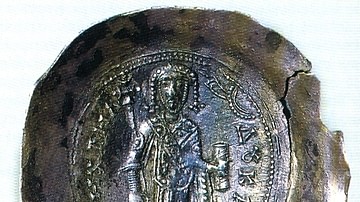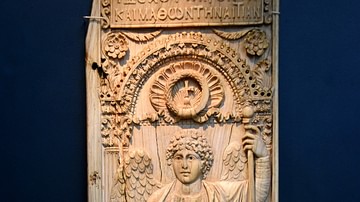Search
Did you mean: Byzantium?
Search Results

Article
The Differences Between Byzantine & Armenian Christianity
Although both the Byzantines and the Armenians were Christian, the types of Christianity they professed had important differences that led to a lack of recognition and tensions between the two groups and a considerable part of their relationship...

Article
Trade in the Byzantine Empire
Trade and commerce were essential components of the success and expansion of the Byzantine Empire. Trade was carried out by ship over vast distances, although for safety, most sailing vessels were restricted to the better weather conditions...

Article
Society in the Byzantine Empire
The society in the Byzantine Empire (4th-15th century CE) was dominated by the imperial family and the male aristocracy but there were opportunities for social advancement thanks to wars, population movements, imperial gifts of lands and...

Article
Daily Life in the Byzantine Empire
Daily life in the Byzantine Empire, like almost everywhere else before or since, largely depended on one's birth and the social circumstances of one's parents. There were some opportunities for advancement based on education, the accumulation...

Definition
Despotate of Epirus
The Despotate of Epirus was one of the successor states of the Byzantine Empire when it disintegrated following the Fourth Crusade's capture of Constantinople in 1204 CE. It was originally the most successful of those successor states, coming...

Article
Pilgrimage in the Byzantine Empire
Pilgrimage in the Byzantine Empire involved the Christian faithful travelling often huge distances to visit such holy sites as Jerusalem or to see in person relics of holy figures and miraculous icons on show from Thessaloniki to Antioch...

Article
Famous Grammarians & Poets of the Byzantine Empire
In the wake of the downfall of the Western Roman Empire and the intellectual collapse of Athens, Byzantine scholars engaged in preserving the Classical Greek language and its literature. Thus they became the guardians of a vanished culture...

Definition
Despotate of the Morea
The Despotate of the Morea was a semi-autonomous appanage of the later Byzantine Empire. The Byzantines retook part of the Peloponnese in Southern Greece in 1262 CE, but the Morea was only officially governed by semi-autonomous despots of...

Image
Byzantine Ivory Diptych Panel
This is one of the largest surviving ivories from the Byzantine Empire. It comes from a hinged 2-leaf diptych, possibly used as a writing table. It shows an archangel holding an orb and sceptre. The style of his drapery is classical, but...

Image
Byzantine Jeweled Bracelet
Gold bracelet decorated with silver, pearls, amethyst, sapphire, glass, and quartz, 500-700. 3.8 x 8.2 cm.
Metropolitan Museum of Art, New York.